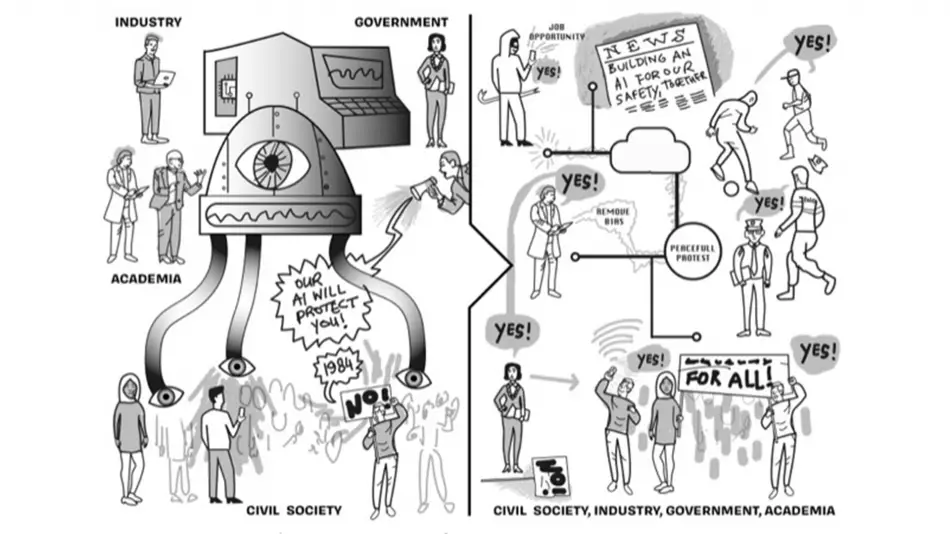A consortium of 26 organisations, including Dutch scientific institutes, government agencies, the private sector and an international cooperation partner, is receiving a grant of over EUR 2 million from the Netherlands Research Council (NWO) and additional co-financing from private partners. By combining the knowledge, expertise and data of all the parties involved, analysing them and translating them into usable models and products, work can be done on better prevention, preparedness and reduction of damage or disasters. The aim is to safeguard human and public values and thus develop confidence in the possibilities that artificial intelligence (AI) can offer in protecting public safety.
Within the consortium, under the name AI-MAPS (Artificial Intelligence for Multi-Agency Public Safety Issues), the 26 organisations combine expertise from the Dutch National Police in the field of public safety, expertise in AI development from Delft University of Technology and expertise in social and human sciences from other research institutes, working closely together with private companies. In this way, technological developments can be studied in conjunction with ethical, legal, social and economic aspects based on concrete situations in various public domains. In this way, we try to realise AI applications that respect and – where possible – promote public values and human rights.
Public Safety
Prof Gabriele Jacobs, Dean of Erasmus University College at Erasmus University Rotterdam and Chair of the consortium: “We are honoured with the award of this grant in the framework of the Netherlands Science Agenda and with the trust NWO has placed in our consortium. With AI-MAPS we will work on an innovative, truly inclusive community-based approach, targeting the root causes of social unrest. We hope that with AI-MAPS we will give our partners more tools to prevent social unrest from occurring and to deal with it properly if it does.”
Public safety is a very topical and relevant social issue. Jacobs: “In recent years, we have seen social unrest across Europe centred on many different issues. Social unrest can have enormous personal, physical and social costs. With AI-MAPS we want to contribute to a free and safe society for all.”

Many parties involved
Public security is vital to the functioning of societies: without it, there is no freedom, no happiness and no prosperity. Many parties are involved in our public security, with an increasing number of public partnerships, new alliances and cross-sector collaborations. These include parties from society (e.g. customers, citizens’ groups or NGOs), public authorities (e.g. municipalities, police forces or first responders) and the private sector (e.g. security companies, IT firms or insurance companies). Data generated by all these parties play an increasingly important role in prevention, preparedness and damage or disasters. Therefore, all these parties are included in the AI-MAPS consortium.
Human-centred and ethical AI
The advent of artificial intelligence (AI) creates new opportunities but also challenges in using the data generated by all these different parties. Safeguarding human and public value is essential. Think of transparency in the use of such data, a certain degree of reciprocity in benefits, public accountability and respect for fundamental rights. While this is already a challenge in a purely public framework, the mix of private and public agencies increases the challenges.
AI-MAPS aims to develop an ecosystem of trust in this. In a variety of use cases, the benefits and safeguards are analysed against the backdrop of a mix of private public-machine agencies. Based on an advanced design-based approach, scalable and generalisable insights are generated. These lead to frameworks and products that facilitate continuous multi-agency learning for the development of human-centred and ethical AI.
Consortium:
Erasmus Universiteit Rotterdam, TU Delft, TNO, Universiteit Leiden, De Haagse Hogeschool, Willem de Kooning Academie, Nederlandse Nationale Politie, Rotterdam Arts & Science Lab (RASL), Civic AI Lab, Deloitte, Google, SynthO, Oditty.ai, SIDN, Nokia, Nationale Politie Lab AI, UbiOps, Rathenau Instituut, PublicSonar, Woonstad Rotterdam, Nederlandse Politie Academie, CENTRIC, HSD, Impact Coalition Safety and Security, Axis Communication, Lanner.
